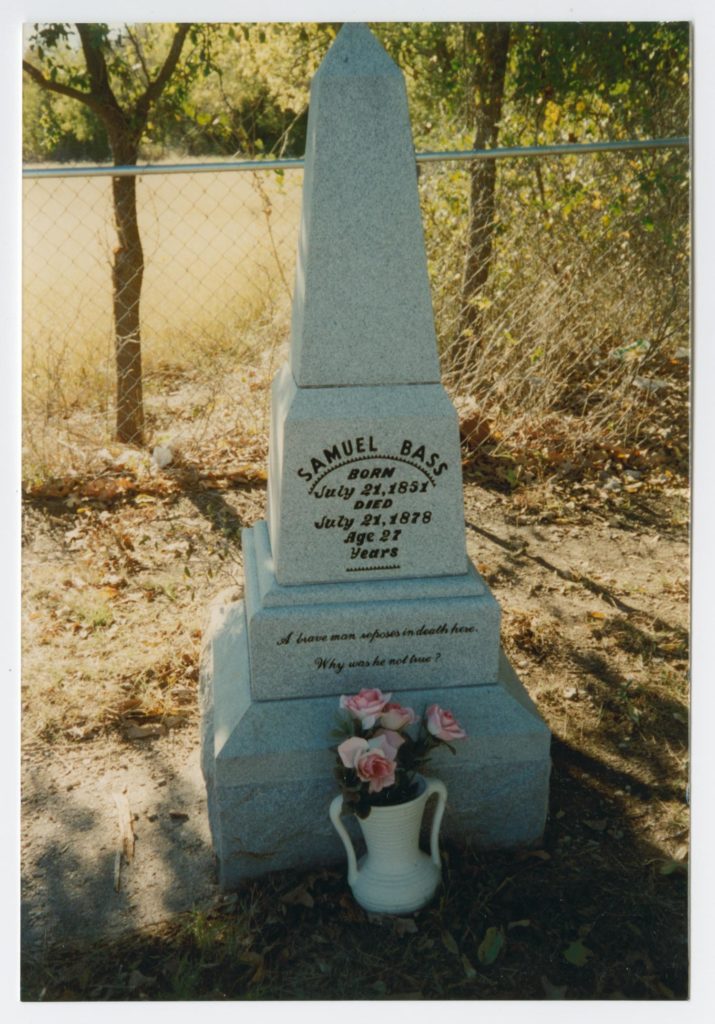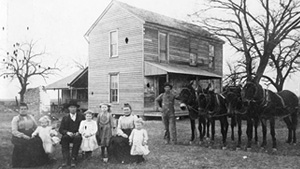The outlaw Sam Bass was born to Daniel Bass (1821 – 1864) and Elizabeth Jane Sheeks Bass (1821 – 1861) on July 21, 1851 in Lawrence County, Indiana. Elizabeth died when Sam was ten. Sam was the third son and the fourth of seven children born to Daniel and Elizabeth. Daniel married Margaret Seibert one year after Elizabeth died and the couple had one son before Daniel died in 1864. Sam’s parents and all of his siblings except one are buried in Indiana.
A Mesquite, Texas historical marker at the heritage park briefly tells the story of an April 10, 1878 train robbery of the Texas & Pacific Railroad by Sam Bass and his gang. Bass, assisted by Seaborn Barnes, Hank Underwood, “Arkansas” Johnson and Frank Jackson. They held up the express car but only came away with $152. In a related story, express agents had buried the real loot of $30,000 in the ashes of the car’s unlit wood stove. Though this was not the gang’s last robbery, this particular caper seems to have infuriated the citizens and the authorities to the point where federal, state and local lawmen focused strongly on apprehending Bass and his associates.
One of Bass’ first successful train robberies was at Big Spring, Nebraska (near Ogallala) where around 11:00 PM on September 18, 1877, they overpowered the station master, directing him to signal the arriving express train to stop. Once in control of the train, they first found only $450 in cash. After assaulting the express agent, they gained access to another safe carrying $60,000 worth of new $20 gold pieces. Encouraged by this, they split up the loot and broke up. Some were captured but Bass and another gang member got away and returned to Denton County, Texas. A few months later they robbed the Texas Central train at the Allen Station on February 22, 1878 producing $1,300. Next, they hit the Texas Central, this time in Hutchins on March 18, 1878. Their next caper was to rob a Texas and Pacific train at Eagle Ford on April 4, 1878 followed six days later with the Mesquite robbery. None of the Texas robberies came even close to matching the payoff of the Nebraska crime.
The story of the Mesquite robbery generally is told in this way. The robbers came up on the locked express car and called out to the guard to open up or they would burn the car. After pouring coal oil on the exterior of the wooden car they set it afire leading the agents to open the door. Finding only the $152 they prepared to escape. They left the two dozen passengers alone and made their way, leaving behind the hidden funds also being transported.
In the Marshall Messenger issue of April 18, 1878, this article expressed one aspect of the local sentiment. “Sam Bass, the train robber, has been in the town of Denton, and was known to be there by the Sheriff of Denton county, but his arrest was not attempted. When Gen. W. P. Lane, U. S. Deputy Marshal, was in Denton last week, he informed this cowardly or criminal official that if he did not, in two hours, begin summoning men to arrest these train robbers, or drive them out of the county, he would have him arrested and placed in the Dallas jail. The Sheriff said that was pretty rough talk; but Gen. Lane told him that he meant what he said, and that it was a disgrace to the county, which contains 6,000 inhabitants, to allow these men to make their headquarters there, and it would deter all decent men from going there to live.” An article the same day in the Galveston Daily News laid out the presence of a larger band of outlaws who hid out in Denton County to prey on the trains and that different selected members led by Bass might be carrying out the attacks.
This sentiment prompted a reaction from the Denton County area posted in the April 27, 1878 issue of the Galveston Daily News entitled “Denton as Good as Dallas” in defense of County Sheriff W. F. Egan. Egan had once hired and later dismissed Bass as a ranch hand when he first came to North Texas. The implication was that some might have felt that Bass’ previous employment might have deterred Egan from pursuing the outlaw, for whatever reason. The article went on to name possible suspects in addition to Bass: Henry Underwood and Frank Jackson.
United States marshals, Pinkerton detectives, Texas Rangers, local authorities and other individuals began seeking Bass and his crew. A round up netted one Jim Murphy who agreed to furnish information about Bass’ whereabouts in return for leniency. Near the end of April Bass and some associates were attacked by Texas Rangers at Murphy’s house at Cove Hollow. Bass was hit but not wounded as two rounds were deflected by his gun belt and rifle stock. Two months later in June Arkansas Johnson was killed and some more of the gang split off. Finally, authorities were tipped off by Murphy that the Bass gang consisting of Bass, Jackson, Barnes and Murphy planned to hit a bank in Round Rock. After casing the town for a few days, but before they were able to carry out the bank job, they were accosted by a local lawman named Grimes. The lawman challenged them for carrying handguns in defiance of the local law prohibiting the carrying of weapons. Deputy Sheriff Grimes was killed in the initial exchange of gunfire. The shooting attracted the attention of Texas Rangers and citizens who then fired on the bandits. Barnes was killed outright and Bass, badly wounded, was carried away from the scene by Jackson. Bass was later found near death in a wooded area out of town. He was returned to Round Rock. He briefly survived his wounds but died on his birthday, July 21, 1878. He was twenty-seven years old.
Murphy was allowed to go free and Jackson got away that day. No one can say for certain what happened to Jackson. Murphy died in June of the following year by taking poison, sometimes described as eye medication which is not lethal when used in a small dosage. There is also some speculation that he may have been murdered by Jackson or another former gang member. To recap, of the Mesquite robbery suspects, Bass and Barnes were killed in Round Rock in 1878, Underwood had left the gang previously was not heard from again, Johnson had been shot and killed in Denton County in the summer of 1878 and Jackson’s fate is unknown.
Bass is buried in Round Rock Cemetery, Below is an image of the current stone marking his grave. At least one photo, not shown here, apparently exists of his original stone but it was replaced with the current one after having been damaged by vandals and treasure seekers. Some genealogy accounts indicate that Sam was married and that he had one or more children. Given his lifestyle and timeline, that is unlikely and we would conclude than any such account is in error.

(Used with permission)


